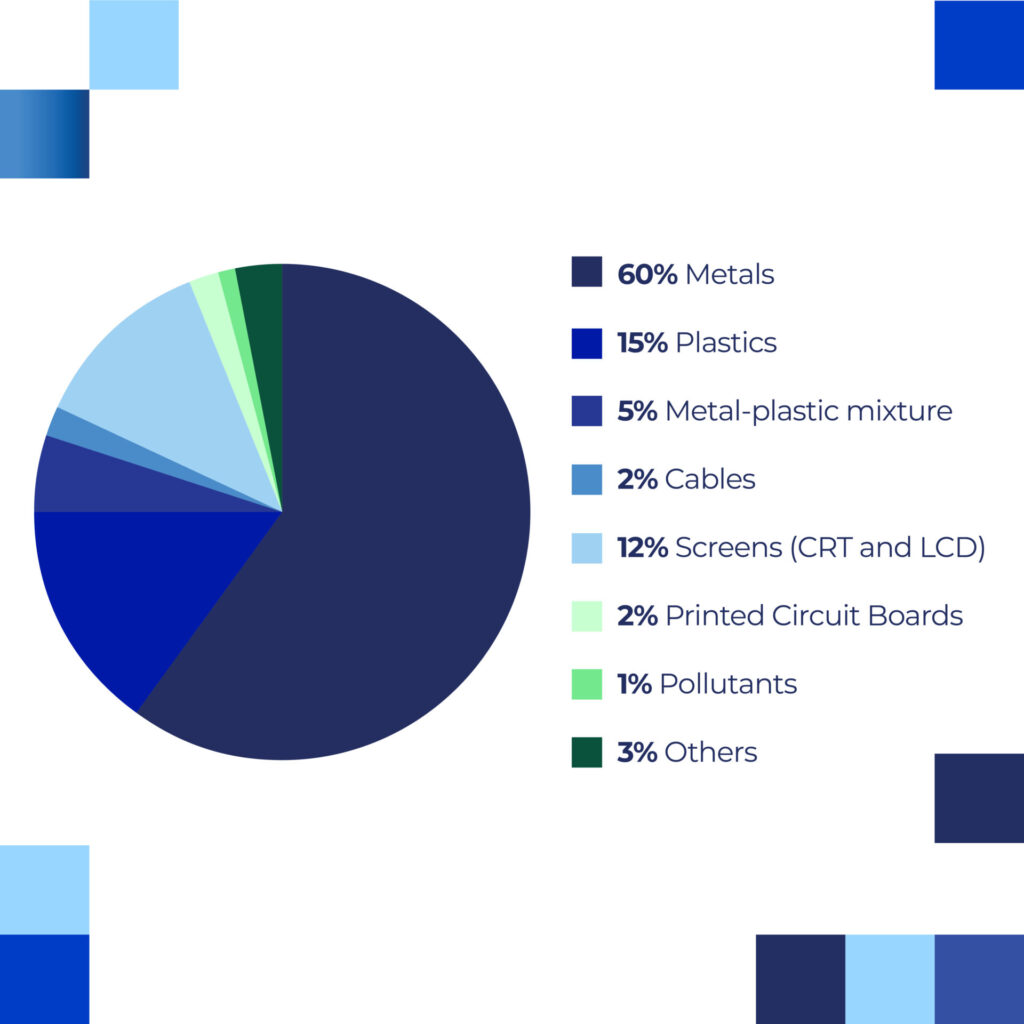Discover the Valuable Materials Hidden in Your Business IT Equipment
By Grant Barton, August 2025

What materials do your redundant IT assets contain?
Let’s start with what materials redundant business IT equipment commonly contains:

As you can see from the graph above, the majority of the materials commonly found in IT equipment, like batteries, laptops and printers, are metals. In fact, around 54% of the components of a laptop are made from aluminium, a highly recyclable material which should not be left to go into landfill.
Other metals, such as copper and iron, are also present in many electronics, which can also be repurposed into new assets if recycled correctly. According to the International Copper Association, copper is 100% recyclable and can be recycled an infinite number of times, meaning this should not be left to go into landfill. Recycling conserves valuable natural resources, saves energy and reduces CO2 emissions.
Plastics also make up a sizeable proportion of IT equipment, often contributing to packaging and external components of IT assets. Now, despite growing awareness of plastic waste, only 9% of all plastic ever produced across the world has been recycled, and in the UK alone, around 5 million tonnes of plastic are used annually. Therefore, recycling plastic properly through ITAD management providers like S2S Group, is more important than ever in reducing businesses’ reliance on virgin raw materials.
Other notable materials which IT equipment can contain are cables, screens, Printed Circuit Boards, and, concerningly, pollutants. Even though 1% may seem like a small proportion of the materials in electronics, if not disposed of correctly, pollutant materials can have severe impacts on the environment. They can filter into nearby water and soil, and local communities around landfill centres, due to their toxic nature.
How S2S Group recycles valuable materials
At S2S Group, we have a comprehensive, step-by-step guide that we follow when disposing of redundant IT equipment.
First, our team collects the equipment from the clients’ site, ensuring a secure collection process to protect important data. Equipment is then transported to our secure facility, where our team conducts an asset review to decipher which assets contain valuable materials. These materials are then recycled through our eco-friendly separation process. Finally, once all assets have been processed, our clients receive a WEEE recycling document, along with any rebate from valuable materials if applicable, to provide evidence of the secure, compliant process.
Top three reasons why businesses should recycle IT assets
In the UK, whilst 46% of waste is recycled, 22% of this still ends up in landfill. E-waste is an ever-increasing problem amongst companies, with over 200,000 tonnes of e-waste being generated annually by UK businesses alone.
As such a large contributor to global waste, businesses must take recycling initiatives seriously, to decrease the amount of waste going to landfill and reduce their carbon footprint. Read our quick guide to find out the many benefits of e-waste recycling.
Did you know that approximately only 2% of the materials in your computer cannot be recycled? That means that 98% of your redundant PC can be recycled and reused!
Identifying which electronics you can recycle, with the support of expert e-waste recycling providers like S2S Group, is vital, as just 1% of rare earth element demand is currently met by e-waste recycling. By helping to improve this figure, your business is one step closer to reducing your carbon footprint, lowering the amount and cost of waste you produce and therefore improving your contribution to the circular economy.
E-waste recycling not only ensures that your business is complying with WEEE regulations and avoiding any financial penalties but also helps you to reap the rewards of becoming more sustainable. 20% of UK consumers are now more inclined to use sustainable brands for their future purchases, meaning there is a huge opportunity for businesses to capitalise on and enhance audience engagement.
By minimising the amount of e-waste your business sends to landfill via correct reuse and recycling processes, you can promote this alongside other sustainable activities and gain a competitive edge within your industry.
When e-waste is taken to landfill sites, not only does it take up space, but it can also release harmful toxins, which are both damaging to the environment and to the health of living species.
IT equipment contains chemicals such as lead, mercury, beryllium and cadmium. When your equipment is recycled, you are preventing the chemical toxins from being released into the water and the air and reducing environmental pollution. By investing in e-waste recycling, you’re helping to keep our air, water and soil safe to use!
Why partner with S2S Group
As a certified IT asset disposal partner, we offer businesses a large range of WEEE recycling, collection, and disposal services to help them reach sustainability goals and reduce impact on the environment.
Holding all relevant environmental permits, we can provide companies and organisations with bins and containers to hold waste, collect it, and then treat it at our Approved Authorised Treatment Facility, meaning all the hard work is done for you! You can have peace of mind that your IT equipment is being handled securely, efficiently, and compliantly.
We can recycle most electrical equipment, such as medical electrical equipment, circuit boards, memory holding media, and monitors. In addition, we can recycle metals found in waste equipment and collect power sources such as batteries ready for recycling, so we’re here to support your business regardless of the scale/ type of electronics.